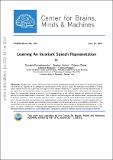| dc.contributor.author | Evangelopoulos, Georgios | |
| dc.contributor.author | Voinea, Stephen | |
| dc.contributor.author | Zhang, Chiyuan | |
| dc.contributor.author | Rosasco, Lorenzo | |
| dc.contributor.author | Poggio, Tomaso | |
| dc.date.accessioned | 2015-12-10T23:51:52Z | |
| dc.date.available | 2015-12-10T23:51:52Z | |
| dc.date.issued | 2014-06-15 | |
| dc.identifier.uri | http://hdl.handle.net/1721.1/100186 | |
| dc.description.abstract | Recognition of speech, and in particular the ability to generalize and learn from small sets of labelled examples like humans do, depends on an appropriate representation of the acoustic input. We formulate the problem of finding robust speech features for supervised learning with small sample complexity as a problem of learning representations of the signal that are maximally invariant to intraclass transformations and deformations. We propose an extension of a theory for unsupervised learning of invariant visual representations to the auditory domain and empirically evaluate its validity for voiced speech sound classification. Our version of the theory requires the memory-based, unsupervised storage of acoustic templates — such as specific phones or words — together with all the transformations of each that normally occur. A quasi-invariant representation for a speech segment can be obtained by projecting it to each template orbit, i.e., the set of transformed signals, and computing the associated one-dimensional empirical probability distributions. The computations can be performed by modules of filtering and pooling, and extended to hierarchical architectures. In this paper, we apply a single-layer, multicomponent representation for phonemes and demonstrate improved accuracy and decreased sample complexity for vowel classification compared to standard spectral, cepstral and perceptual features. | en_US |
| dc.description.sponsorship | This work was supported by the Center for Brains, Minds and Machines (CBMM), funded by NSF STC award CCF - 1231216. | en_US |
| dc.language.iso | en_US | en_US |
| dc.publisher | Center for Brains, Minds and Machines (CBMM), arXiv | en_US |
| dc.relation.ispartofseries | CBMM Memo Series;022 | |
| dc.rights | Attribution-NonCommercial 3.0 United States | * |
| dc.rights.uri | http://creativecommons.org/licenses/by-nc/3.0/us/ | * |
| dc.subject | Speech Recognition | en_US |
| dc.subject | Invariance | en_US |
| dc.subject | Machine Learning | en_US |
| dc.subject | Language | en_US |
| dc.title | Learning An Invariant Speech Representation | en_US |
| dc.type | Technical Report | en_US |
| dc.type | Working Paper | en_US |
| dc.type | Other | en_US |
| dc.identifier.citation | arXiv:1406.3884v1 | en_US |
